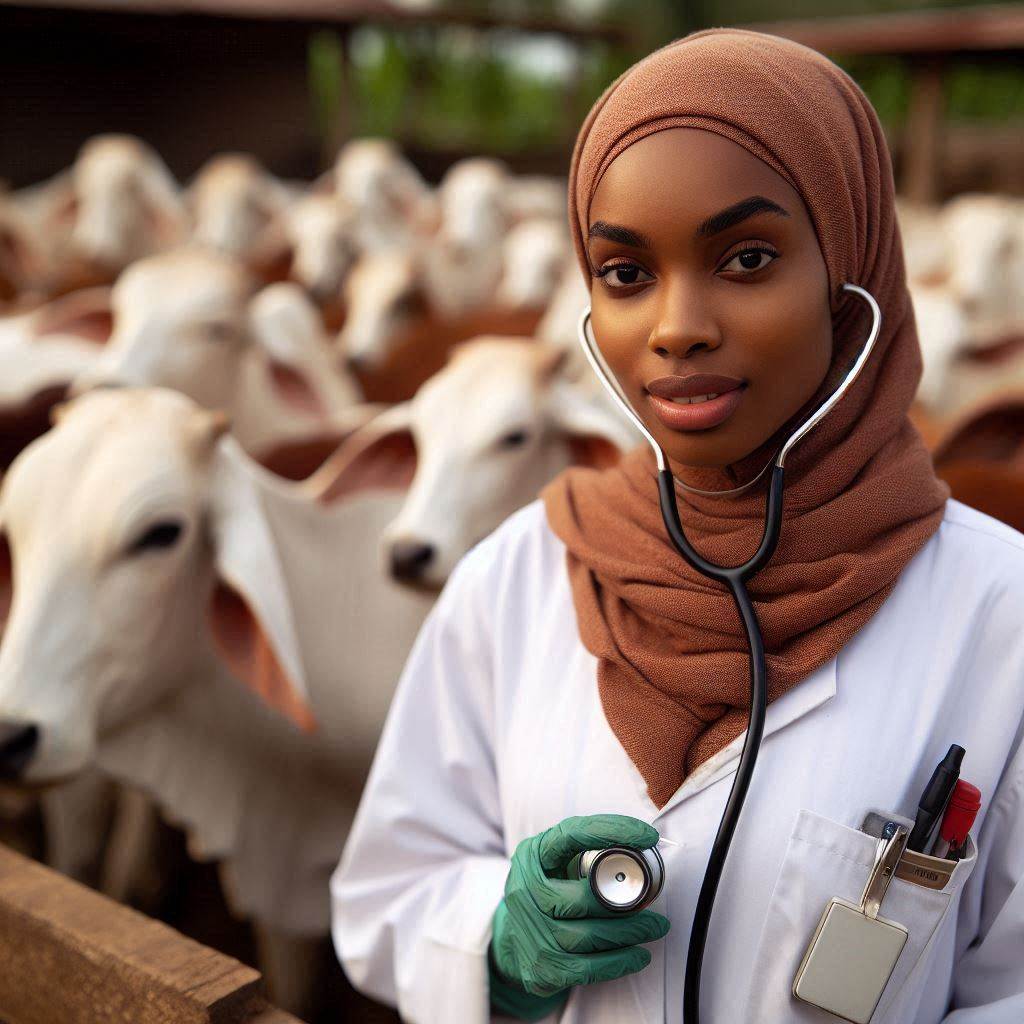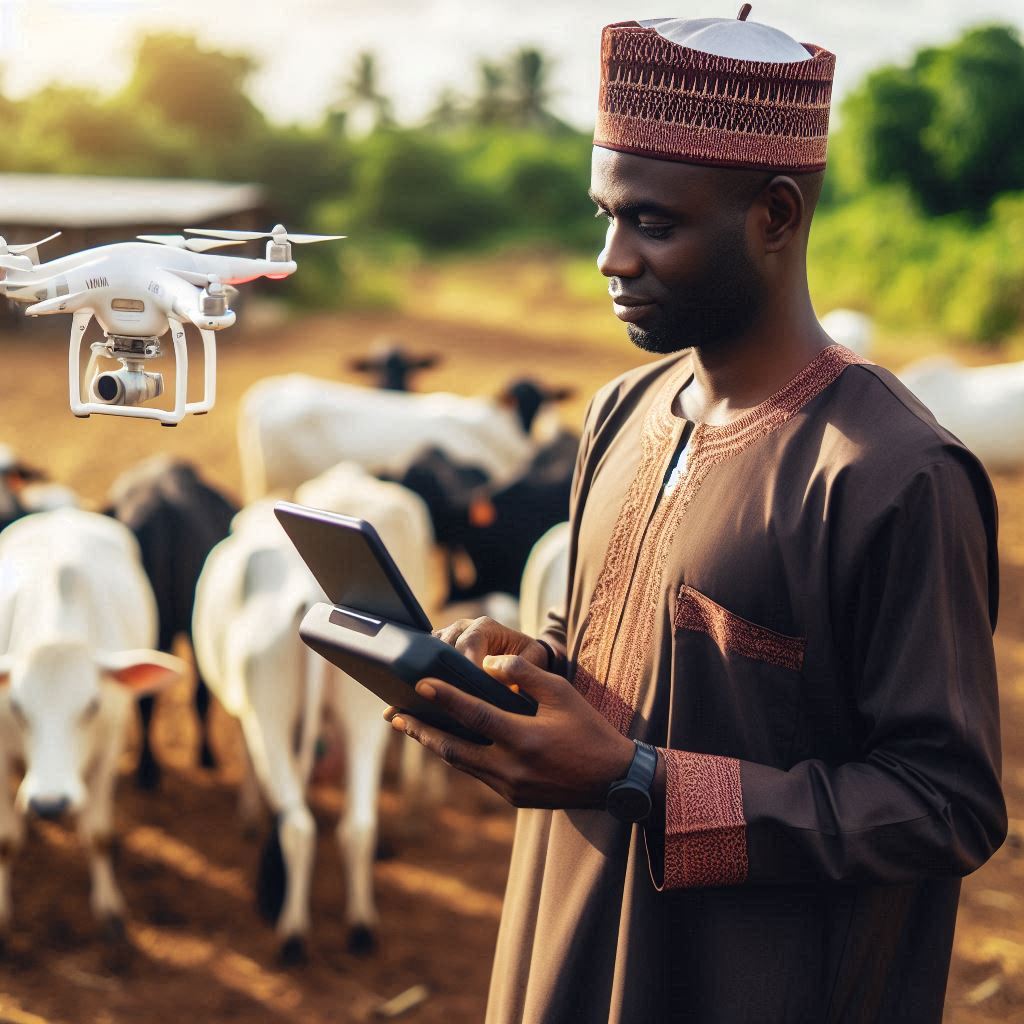Introduction
Climate change refers to long-term alterations in temperature, precipitation, and weather patterns.
It is largely driven by human activities.
These changes impact various sectors, including agriculture and livestock.
Livestock plays a crucial role in Nigeria’s economy and food security. It provides meat, milk, and other products essential for nutrition.
Livestock farming supports millions of Nigerians by providing employment and income. It contributes significantly to the country’s GDP and rural development.
In Nigeria, livestock is vital for both subsistence and commercial purposes. Farmers rely on livestock for their livelihoods.
Climate change poses significant challenges to livestock production.
These challenges threaten food security and the economic stability of livestock-dependent communities.
Understanding the impact of climate change on livestock is essential. It helps develop strategies to mitigate negative effects and ensure sustainable livestock farming.
Addressing climate change is crucial for protecting Nigeria’s livestock sector and ensuring its continued contribution to the economy.
Read: Field Work & Practical Training in Nigerian Forestry Schools
Impact of Climate Change on Nigerian Livestock
Climate change poses significant threats to Nigerian livestock farming, affecting various aspects of the industry. The following points outline the major impacts:
Changes in Temperature and Rainfall Patterns Affecting Grazing Lands
Climate change is altering temperature and rainfall patterns, which directly impacts grazing lands.
Higher temperatures can reduce the nutritional value of forage, leading to poorer livestock health.
Elevated temperatures also increase the rate of evaporation, reducing the moisture content in the soil and further degrading the quality of grazing lands.
Additionally, inconsistent rainfall patterns can cause both drought and flooding, disrupting the availability of forage and damaging grazing lands.
These changes can lead to overgrazing as livestock congregate in areas where forage is still available, exacerbating land degradation and reducing the overall productivity of grazing lands.
Increase in Frequency and Severity of Droughts Leading to Water Scarcity
The frequency and severity of droughts are increasing due to climate change, resulting in water scarcity.
This scarcity affects livestock hydration and forage growth, leading to malnutrition and dehydration.
Farmers face the challenge of maintaining adequate water supplies for their herds during prolonged dry periods.
Water scarcity can also limit the growth of forage crops, compounding the issue of feed shortages.
Livestock that do not receive adequate water and nutrition are more susceptible to disease and have lower reproductive rates, further impacting the productivity and sustainability of livestock farming.
Spread of Diseases and Pests Due to Changing Climate Conditions
Warmer temperatures and altered precipitation patterns create favorable conditions for the spread of diseases and pests.
Livestock are at greater risk of contracting diseases such as tick-borne illnesses and parasitic infections.
These health issues can lead to increased mortality rates and reduced productivity.
For example, warmer and wetter conditions can expand the habitat range of ticks and other parasites, exposing livestock to new threats.
Additionally, the stress caused by extreme weather events can weaken livestock immune systems, making them more susceptible to infections.
Farmers must invest more in veterinary care and disease prevention measures, increasing their operational costs.
Decrease in Livestock Productivity and Reproduction Rates
The combined effects of heat stress, poor nutrition, water scarcity, and increased disease prevalence lead to a decrease in livestock productivity and reproduction rates.
Heat stress can impair reproductive functions, while malnutrition and disease reduce growth rates and overall health.
This decline in productivity and reproductive efficiency threatens the sustainability of livestock farming in Nigeria.
Lower productivity means less meat, milk, and other animal products, impacting food security and livelihoods.
Reproductive challenges, such as reduced fertility and higher rates of miscarriages, can slow the growth of livestock populations, making it harder for farmers to rebuild their herds after losses.
Climate change significantly impacts Nigerian livestock farming, affecting grazing lands, increasing drought frequency, spreading diseases and pests, and decreasing productivity and reproduction rates.
To mitigate these challenges, farmers need to adopt adaptive strategies such as diversified forage crops, improved water management, shade and shelter for livestock, rotational grazing, soil conservation practices, enhanced disease control measures, and breeding resilient livestock.
Addressing these climate-related issues is crucial for ensuring the sustainability and productivity of the Nigerian livestock industry.
By embracing these adaptive strategies, Nigerian farmers can safeguard their livelihoods, contribute to national food security, and support the long-term viability of the livestock sector.
Read: Scholarship and Funding Opportunities for Forestry Students in Nigeria
Explore Further: How Plant Breeding Can Improve Food Security in Nigeria
Effects on Livelihoods
Decreased Income for Farmers and Herders
Climate change significantly impacts the income of farmers and herders by reducing livestock productivity and increasing operational costs.
Decreased forage availability and quality, higher disease prevalence, and lower reproductive rates lead to reduced meat, milk, and other animal product yields.
Consequently, farmers earn less from their livestock, which directly affects their financial stability and ability to invest in their farms.
Additionally, the increased need for veterinary care, supplemental feeding, and water management systems raises the cost of maintaining livestock, further straining farmers’ finances.
Increased Food Insecurity and Malnutrition
The decline in livestock productivity due to climate change contributes to increased food insecurity and malnutrition.
Livestock are a crucial source of protein and essential nutrients for many Nigerian communities.
Reduced livestock yields mean less availability of meat, milk, and other animal products, leading to dietary deficiencies.
This situation is particularly critical in rural areas where livestock farming is a primary food source.
Food insecurity also exacerbates health issues, particularly among children, pregnant women, and the elderly, who are more vulnerable to malnutrition.
Loss of Traditional Knowledge and Practices Related to Livestock Rearing
Climate change threatens traditional knowledge and practices related to livestock rearing.
Indigenous practices, developed over generations, are often finely tuned to specific local climates and ecosystems.
As climate conditions change, these practices may become less effective or obsolete.
For example, traditional grazing patterns may no longer be viable due to altered rainfall and forage availability.
The loss of these practices can lead to a decline in community resilience and self-sufficiency.
Additionally, younger generations may be less inclined to learn and continue these traditional methods if they see them as ineffective, leading to cultural erosion.
Displacement of Communities Dependent on Livestock for Survival
Communities that rely heavily on livestock for their survival face the risk of displacement due to climate change.
Prolonged droughts, increased frequency of extreme weather events, and degradation of grazing lands can make it untenable for these communities to sustain their livestock.
As a result, many are forced to migrate in search of better living conditions and alternative livelihoods.
Displacement disrupts social structures, economic stability, and cultural identities.
It also places additional strain on urban areas and other regions where displaced populations relocate, potentially leading to conflicts over resources and increased socio-economic challenges.
The effects of climate change on livestock farming in Nigeria extend far beyond the immediate challenges of managing livestock health and productivity.
Decreased income for farmers and herders, increased food insecurity and malnutrition, the loss of traditional knowledge and practices, and the displacement of communities are profound and far-reaching impacts.
To mitigate these effects, comprehensive strategies must be implemented.
These include climate-resilient agricultural practices, improved access to resources and training, and policies that support sustainable livestock farming.
By addressing these issues, Nigerian farmers can better adapt to climate change, ensuring their livelihoods and contributing to the nation’s food security and economic stability.
Read: Overview of Horticulture in Nigeria

Adaptation and Mitigation Strategies
Adoption of Climate-Smart Agricultural Practices
Farmers and herders in Nigeria are increasingly facing challenges from the impacts of climate change on their livestock.
One key strategy to adapt to these challenges is the adoption of climate-smart agricultural practices.
This includes practices such as conservation agriculture, agroforestry, and integrated crop-livestock systems.
These practices help in improving the resilience of livestock production systems to the changing climate by enhancing resource use efficiency, reducing greenhouse gas emissions, and increasing the overall productivity of the system.
Diversification of Livestock Breeds and Species
Another important strategy is the diversification of livestock breeds and species.
This involves introducing new breeds that are more resilient to the changing climate conditions.
By diversifying the livestock population, farmers can reduce their vulnerability to climate-related risks such as diseases, droughts, and extreme weather events.
Additionally, diversification can also help in improving the overall genetic diversity of the livestock population, making it more adaptable to future climate changes.
Improved Water Management Techniques
Water scarcity is a major issue for livestock production in Nigeria, exacerbated by climate change impacts such as changes in rainfall patterns and increasing temperatures.
To adapt to these challenges, improved water management techniques are crucial.
This includes practices such as rainwater harvesting, water recycling, and efficient irrigation systems.
By enhancing water efficiency on farms and in grazing areas, farmers can ensure a reliable water supply for their livestock, even during periods of drought and water shortages.
Capacity Building and Awareness Programs
Capacity building and awareness programs are essential for equipping farmers and herders with the knowledge and skills needed to adapt to the impacts of climate change on livestock production.
These programs can involve training sessions, workshops, extension services, and information campaigns on climate-smart practices, water management, and livestock health.
By increasing the capacity of farmers and herders to respond to climate change, these programs can help in building resilience and sustainability in the livestock sector.
In summary, with the adoption of these adaptation and mitigation strategies, farmers and herders in Nigeria can better cope with the challenges posed by climate change on livestock production.
By implementing climate-smart agricultural practices, diversifying livestock breeds, improving water management, and investing in capacity building programs, the livestock sector can become more resilient and sustainable in the face of a changing climate.
Read: Innovations in Nigerian Horticulture
You Might Also Like: Pasture and Range Management Research Centers in Nigeria
Conclusion
Climate change has had profound impacts on Nigerian livestock, affecting the sector in multiple ways.
Increased heat stress, reduced water and forage availability, and heightened disease susceptibility have all contributed to a decline in livestock productivity.
These challenges threaten food security, livelihoods, and the economic stability of agricultural communities across Nigeria.
To address these pressing issues, it is essential to adopt sustainable practices and implement robust policies.
Investing in climate-resilient infrastructure, such as improved water management systems and protective shelters, can help mitigate the adverse effects of extreme weather.
Encouraging sustainable grazing practices and the use of drought-resistant forage species will maintain pasture health and productivity.
Moreover, enhancing disease surveillance and control is critical to managing and preventing climate-related outbreaks, safeguarding both animal and human health.
Supporting research and innovation in developing climate-resilient livestock breeds and adaptive farming techniques will be crucial for the sector’s long-term sustainability.




